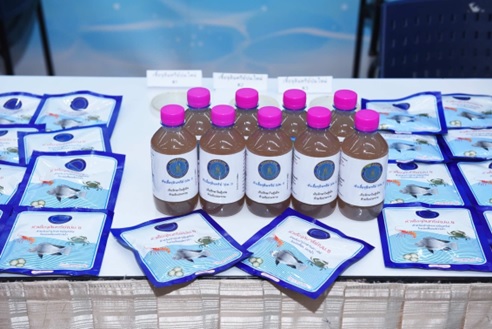On 29 March 2023, a press conference was held to announce a new beneficial microbe to control pathogens and reduce the use of antibiotics in aquaculture. The microorganism has been screened and tested to demonstrate an ability to inhibit biofilm formed by pathogens causing diseases. It was a result of a collaborative research between BIOTEC-NSTDA and the Department of Fisheries, Ministry of Agriculture and Cooperatives.

BIOTEC Executive Director Dr. Wonnop Visessanguan revealed that NSTDA and the Department of Fisheries have entered a 5-year agreement in 2020 to develop innovative solutions for sustainable aquaculture. One of the research topics is the development and production of beneficial microorganisms to improve aquaculture production efficiency. The scope of research includes making an improvement on current microbial strain used by the department and its production process, as well as developing new strains. To identify new effective strains, Dr. Wonnop explained that extensive studies had been performed on potential microbes to test their functionalities – abilities to digest nutrients, remove nitrogen and waste, and maintain balanced microbial communities in shrimp gut and in pond – and safety – whether they produce toxins, cause toxicity in animal cells, contain antibiotic resistance genes and the potential of antibiotic resistance genes transferring to the environment. In addition, microbial properties such as production process, growth rate, spore production and environmental resilience also were thoroughly studied both in lab and on farm. These scientific data are essential not only to obtain effective strains that will prevent diseases but also to support the registration process for microbes used in aquaculture.

“Through comprehensive experiments, we found that Bacillus subtilis Natto (BSN1) can inhibit biofilm formation by Vibrio harveyi and V. parahaemolyticus – causative agents of luminous bacterial disease, acute hepatopancreatic necrosis disease (AHPND) and early mortality syndrome (EMS) in shrimp. Test results have shown that the mixture of BSN1 and shrimp feed can reduce shrimp mortality caused by these two pathogens, making it a suitable shrimp feed additive,” said Dr. Wonnop. An agreement has been reached between NSTDA and the Fisheries Department to allow the department to use Bacillus subtilis Natto (BSN1) for public services.

Fisheries Department Director-General Mr. Chalermchai Suwannarak said that the collaboration established between NSTDA and his department is aimed at improving the competitiveness of Thai aquaculture industry in the global market. The department will produce and distribute Bacillus subtilis Natto (BSN1) to its 24 stations for onsite mass production for giving out to aquaculture farms. The department also plans to transfer the production technology to 18 aquaculture cooperatives and association so that they can produce this feed additive for their members. This beneficial microbe will reduce the use of antibiotics, contributing to sustainable aquaculture.

